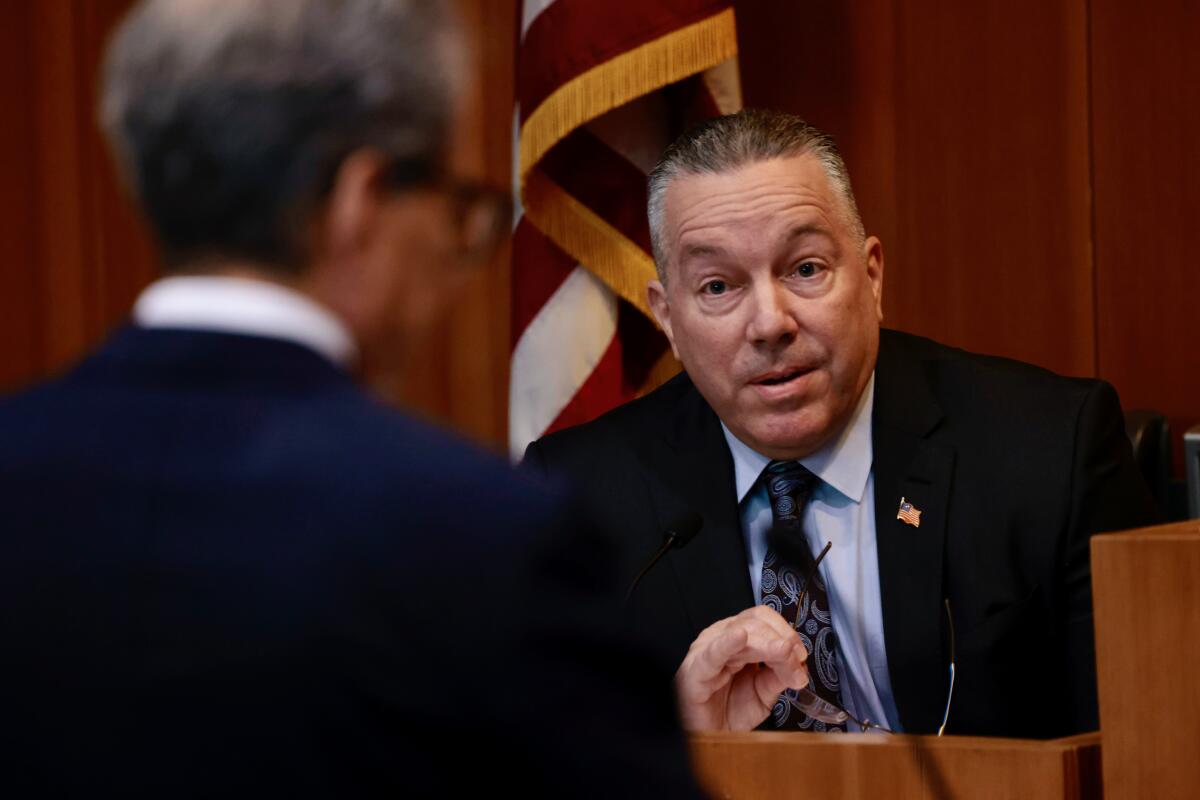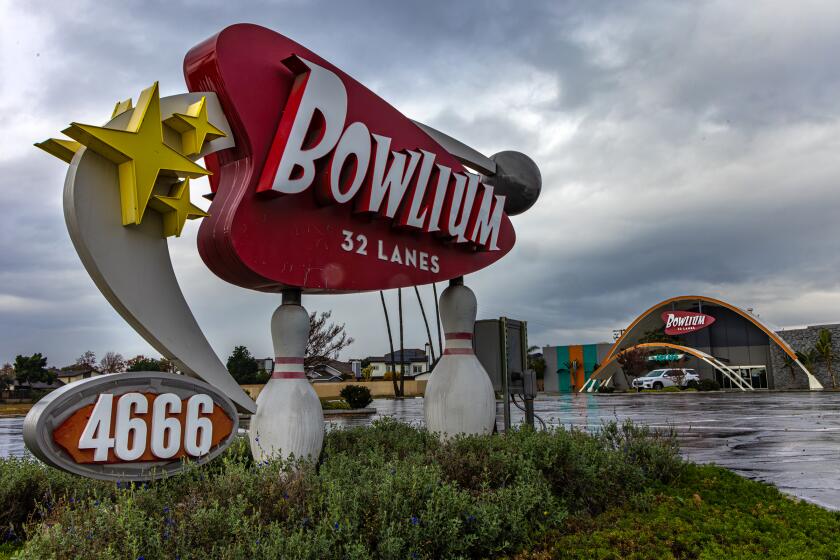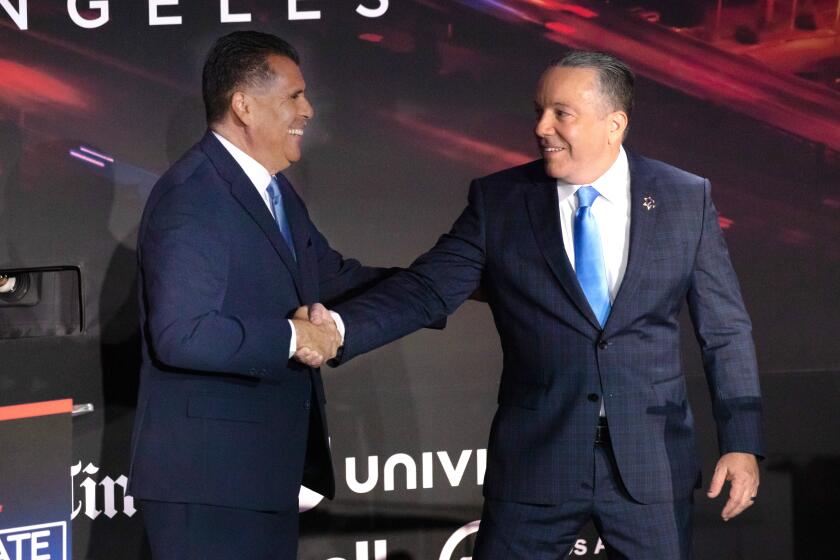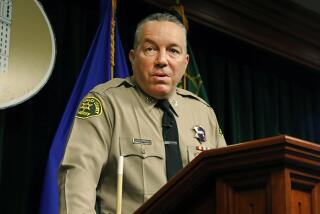Villanueva denies existence of deputy gangs as L.A. County officials seek accountability

- Share via
During four hours of combative testimony in front of the Civilian Oversight Commission on Friday morning, former Los Angeles County Sheriff Alex Villanueva attempted to minimize the problem of deputy gangs, refusing to acknowledge their existence and alleging the problem of tattooed subgroups is “actually disappearing” from the department.
“You’re still trying to pretend that deputy gangs exist and that they operate in the countryside pillaging and plundering,” he told special counsel Bert Deixler. Minutes before, Villanueva testified that if the department got rid of all deputies with controversial tattoos the county would have to fire so many people that it would create a “gargantuan public safety crisis.”
The former sheriff, currently running for county supervisor, told the commission he never did a systematic investigation into deputy gangs. He said he did not ask employees about the nature of their tattoos, and did not question his top leadership about their involvement in the groups, even though his former chief of staff publicly admitted to once being a member of the Grim Reapers, linked to the now-closed Lennox station.
For years, Villanueva defied subpoenas to testify under oath. It was only after a county judge scheduled a hearing to decide whether to order him to comply that he reversed course. Though there were no major surprises in Friday’s testimony, commission chair Sean Kennedy said the hearing served an important purpose: showing that even the county’s former top cop can face tough questions.
Four L.A. County sheriff’s deputies were fired and others were disciplined after a dispute involving members of a gang known as the Industry Indians.
“It is essential that an elected sheriff be held accountable when he flouts oversight subpoenas,” Kennedy told The Times on Saturday. Demonstrating that, he said, also “puts the pressure” on the current sheriff to continue moving forward with his plans to rid the department of deputy gangs.
Sheriff Robert Luna, who took office in 2022, vowed last year to “eradicate all deputy gangs” from the department. But the problem has vexed oversight officials and county leaders for years, and there’s no clear path to eliminating them.
For five decades, the Sheriff’s Department has been plagued by rogue groups of deputies accused of running roughshod over certain stations and promoting a culture of violence. The groups are commonly known by names such as the Executioners, the Banditos, the Regulators and the Little Devils, and members typically have matching, sequentially numbered tattoos featuring macabre imagery.
Last year, Inspector General Max Huntsman ordered nearly three dozen deputies to submit to questioning about deputy gangs and show investigators their tattoos in the hope of compiling a list of potential gang members. But the unions filed suit and a judge temporarily blocked the county watchdog’s inquiries.
At the same time, the sheriff has been working to put in place a stronger policy banning participation in deputy gangs, though the latest proposal is still being hammered out with the unions. Though Villanueva implemented an anti-gang policy in 2020, critics said it didn’t go far enough.
The oversight commission, meanwhile, has been trying to investigate deputy gangs for years, despite ongoing problems with reluctant witnesses. The former undersheriff, Tim Murakami, has yet to comply with the commission’s subpoena efforts — but Deixler still raised questions about his affiliations during Friday’s hearing.
Former L.A. County Sheriff Alex Villanueva, his 2018 campaign and a manager at Tam’s Super Burgers have all agreed to pay fines after investigators uncovered a campaign money laundering scheme.
Minutes after the testimony began, Deixler played a 2022 clip of Villanueva likening deputy gangs to unicorns.
“Everybody knows what a unicorn looks like, but I challenge you, name one,” he said during a televised pre-election debate. “Name a single deputy gang member.”
Then Deixler put a photo of a unicorn on the screen and asked: “That’s a unicorn, isn’t it, sir?”
Seconds later, he displayed a picture of the former undersheriff and, referencing the name of an alleged deputy gang linked to the East Los Angeles station, said: “And that’s a Caveman, isn’t it, sir?”
Villanueva bristled, stiffly telling Deixler, “That’s a former undersheriff.”
At one point, Deixler asked Villanueva whether he’d been a Caveman himself, which the former sheriff denied.
Despite the academic setting at Loyola Law School, the special hearing on deputy gangs — the commission’s ninth in the past two years — was marked by spectacle and bluster. Audience members interrupted often with cheers, jeers and obscenities, while the former sheriff repeatedly insulted the commission, the inspector general, the media and the special counsel’s lines of inquiry, which he called “dumb” and “appalling.”
Deixler forcefully questioned Villanueva — at times shouting questions — about some of the most publicized deputy groups, as well as a newly revealed one first made public last week in The Times. That group, the Industry Indians, came to light when the department began investigating an off-duty fight in the parking lot of a Montclair bowling alley and discovered that some of the deputies involved allegedly had Industry Indians tattoos.
Lt. Shawn O’Donnell’s lawsuit accuses Sheriff Robert Luna of overseeing retaliation against those who supported his predecessor in the 2022 election.
Once Villanueva admitted knowing about the incident, Deixler questioned whether he’d been aware of it in late 2022 when he compared deputy gangs to unicorns. The former sheriff said he only learned of the investigation as he was leaving office, and that it was an example of “misconduct” at a social event, not evidence of gang behavior.
Villanueva said he did not ask people what “ink they have on their bodies,” and that during his time in office he “never examined anyone’s tattoo.” Even after then-Chief April Tardy — who is now the undersheriff — testified to the commission that the Banditos met the legal definition of a law enforcement gang, Villanueva said he did not launch an investigation.
“We elected not to touch this matter only because it became a hot political potato that you guys were eager to jump on,” he said, adding that he thought Tardy’s testimony was false.
Instead, he said, he spent his time in office focused on rooting out misconduct, which he argued was more important than investigating tattoos or subgroups.
“It’s no secret there are subgroups within the Sheriff’s Department,” he said. “They exist everywhere, and they will always exist.”
Calling them gangs, he said, is “missing the key element — that is misconduct.”
For some of the community members who turned out to watch the hearing, the takeaways seemed predictable.
“He’s still denying deputy gangs exist, and he’s still denying that gang tattoos are a problem in the department,” said Stephanie Luna, whose nephew was killed by deputies in 2018. “He said the same things he’s been saying for years, but all in one shot.”
But Friday’s hearing may not be the only opportunity to question Villanueva. When the testimony ended, Deixler still had questions left to ask — and the commission signaled interest in calling the former sheriff back in March.
More to Read
Sign up for Essential California
The most important California stories and recommendations in your inbox every morning.
You may occasionally receive promotional content from the Los Angeles Times.













